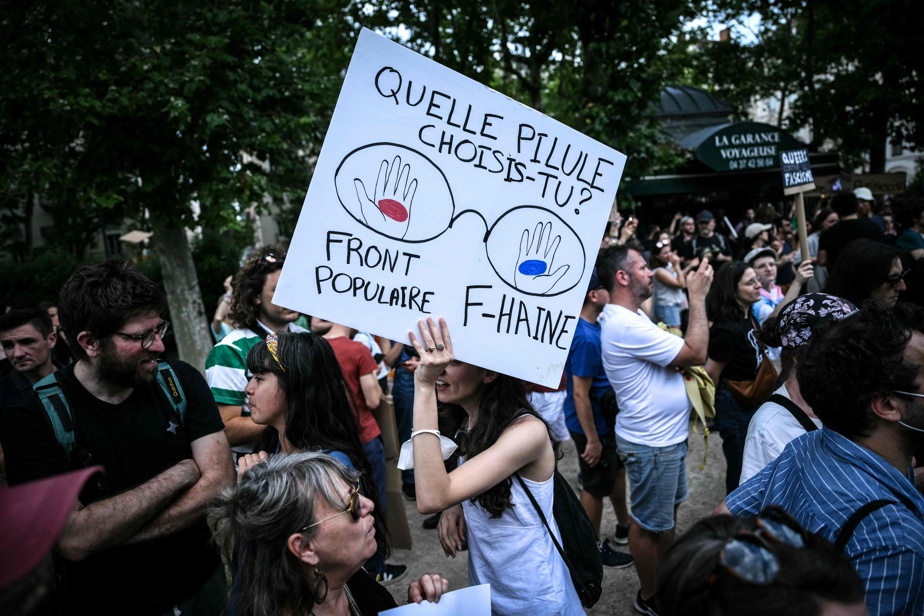The hectic days following French President Emmanuel Macron’s announcement of the dissolution of the National Assembly have given rise to multiple negotiations between parties that have considerably changed the situation ahead of the election. The head of state had hoped to recruit candidates from among the incumbent elected officials on the left and right of his centrist coalition, but the scenario did not materialize as he had hoped, notes Jean-Pierre Beaud, professor of political science at the Université du Québec à Montréal.
The radical left formation La France insoumise (LFI), communists, environmentalists and socialists quickly managed to agree on a program to present a single list of candidates under the banner of the “New Popular Front”.
On the right, the Republicans’ rifts did not immediately lead to significant support for the centrist camp. The contested president of the traditional right-wing party, Éric Ciotti, in favor of a coalition with the RN, brought with him few outgoing deputies and will present candidates in around sixty constituencies without opposition from the radical right. The Republicans of the “historical movement” opposed to the RN will present candidates in nearly 400 constituencies. “It may be a little complicated for voters to decide between them on the ballot,” warns Olivier Ihl, professor of politics at the University of Grenoble.
Several French media published reports suggesting that the president had decided in a restricted circle to hold legislative elections, even belatedly notifying Prime Minister Gabriel Attal, who would have agreed to take the lead in the legislative election campaign in part to compensate for the unpopularity of the head of state with the population. Many deputies from the centrist camp reacted to the dissolution with anger, fearing for their political survival.
The most recent IFOP poll is not likely to reassure them since it places the RN at 33% of voting intentions, ahead of the left-wing coalition, at 28%, and the centrist coalition, at 18%. The Republicans of the “historic channel” follow far behind with 5% of the votes, ahead of the group of candidates led by Éric Ciotti with the support of the RN. Both Mr. Beaud and Mr. Ihl believe the president’s camp will likely finish third in the number of votes.
The two-round voting system used in France during legislative elections makes it impossible to predict, based on national voting intentions, how the 577 seats in the National Assembly will be distributed. At the level of each constituency, candidates supported by at least 12.5% of registered voters in the first round remain in the running for the second if none reaches the 50% threshold, which can give rise to “triangulars” with three candidates.
When the radical right was represented in the second round, traditional parties called for voting for the candidate most likely to prevent the victory of its candidates, but this practice has faded with the relative normalization of the RN and makes the projections even more complex.
Olivier Ihl notes that the unpopularity of the leader of La France insoumise, Jean-Luc Mélenchon, who makes a controversial speech on the Israeli-Palestinian conflict, Ukraine and the European Union, risks harming the transfer of votes to the left to the second round. “The share of the population who is afraid of LFI is higher than that who is afraid of the RN,” he says.
“We don’t really know what will happen in the second round,” adds Mr. Beaud, who wonders in particular how the supporters of the traditional right who hate Jean-Luc Mélenchon and Marine Le Pen will vote if they have to opt in the second round for a candidate from the left-wing coalition or another from the RN.
Jordan Bardella, the president of the RN, indicated that he would agree to become prime minister only if his party won an absolute majority in the National Assembly. In this case, the president would have no choice but to appoint a prime minister from the radical right and engage in an uncomfortable cohabitation.
If the RN or the left coalition comes first without an absolute majority of seats, other scenarios are possible, notes Mr. Beaud. A “grand German-style coalition” – the New Popular Front, possibly without LFI, the centrist parties loyal to the president and anti-RN Republicans – supporting a moderate left or right prime minister could in particular be envisaged, notes the analyst.
The centrist camp seeks in particular to argue that the policies defended by the RN and the left-wing coalition would precipitate a financial crisis in France. He proposes measures likely to reduce the cost of living, a theme on which the left coalition is also increasing its promises. The RN, which had promised to repeal the pension reform carried out under the aegis of the outgoing president, is delaying its promises in this area and says it is ready to operate in cohabitation with Emmanuel Macron.
Mr Ihl notes that taking over the government would be a significant challenge for the RN. “When a populist party is in opposition, it has the most beautiful ministry, the ministry of words. Coming to power would put them to the test of the truth,” he said.




